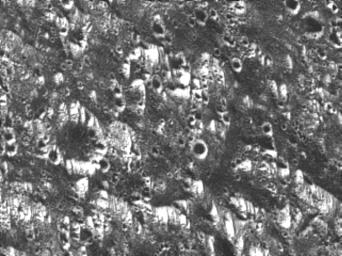
|
Ganymede - Dark Terrain in Galileo Regio
- Click the image above for a larger view
- Full-Res JPEG (640 x 480) (60.7 kB)
- Full-Res TIFF (640 x 480) (286.6 kB)
Caption:
This view of a part of the Galileo Regio region on Jupiter's moon Ganymede shows fine details of the dark terrain that makes up about half of the surface of the planet-sized moon. One of many ancient impact craters in the region is visible at the middle left. The crater is cut by numerous fractures, showing that the ancient crust was highly deformed early in Ganymede's history. Dark areas may have originated from dark material thrown off by dark meteorites hitting the surface in thousands of impact events. In this view, north is to the top and the sun illuminates the surface from the lower left about 58 degrees above the horizon. The area shown, at latitude 19 degrees north, longitude 149 degrees west, is about 19 by 26 kilometers (12 by 16 miles); resolution is about 80 meters (262 feet) per pixel. The image was taken June 27 at a range of 7.652 kilometers (4,755 miles).
Background Info:
The Jet Propulsion Laboratory manages the Galileo mission for NASA's Office of Space Science.
Cataloging Keywords:
| Name | Value | Additional Values |
|---|---|---|
| Target | Ganymede | |
| System | Jupiter | |
| Target Type | Satellite | |
| Mission | Galileo | |
| Instrument Host | Galileo Orbiter | |
| Host Type | Orbiter | |
| Instrument | Solid-State Imaging (SSI) | |
| Detector | ||
| Extra Keywords | Crater, Grayscale, Impact | |
| Acquisition Date | ||
| Release Date | 1997-09-07 | |
| Date in Caption | ||
| Image Credit | NASA/JPL | |
| Source | photojournal.jpl.nasa.gov/catalog/PIA00278 | |
| Identifier | PIA00278 | |
